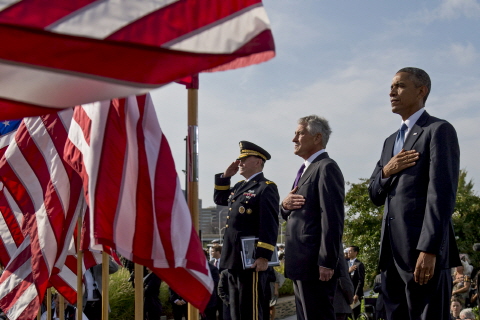
Americans and Their Flag
Colin Kaepernick, the San Francisco 49ers quarterback, has created an uproar among football fans and others by refusing to stand for the national anthem. “I am not going to stand up to show pride in a flag for a country that oppresses black people and people of color,” he said. Why are national symbols, staples at many sporting events, so important to Americans?
* quarterback =[ 미식축구에서] 쿼터백(전위와 하프백의 중간 위치에서 뛰면서 공격을 지휘하는 선수)/ uproar = 대소동, (엄청난) 소란[논란]/ refuse = (요청・부탁・제의・초대 등을) 거절[거부]하다/ national anthem = 국가(國歌)/ show pride = 긍지[자부심, 자신감]를 보이다/ oppress = 탄압[억압]하다/ people of color = 유색 인종/ staple = 요소, 주성분
 많은 스포츠 경기의 주요 성분이며 국가의 상징이 되는 것들이 미국인에게는 그렇게 중요한가요?
많은 스포츠 경기의 주요 성분이며 국가의 상징이 되는 것들이 미국인에게는 그렇게 중요한가요?
1. Symbols Pledge Allegiance to Principles
Instead of focusing on the conventions Colin Kaepernick is breaking, we should be focusing on the standard
he is setting.
2. The Emotional Attachment of National Symbols
National symbols deserve respect not because they are static representations of unchanging ideals.
3. An American Value I Fought to Defend
If the flag symbolizes freedom of expression, Kaepernick was absolutely correct in focusing his protest toward the flag.
4. Don’t Mess With the Stars and Stripes
The U.S. has a holiday honoring the flag, and federal guidelines for its use; schoolchildren salute it and
members of Congress recite the pledge of allegiance every business day.
Sample Essay
The Emotional Attachment of National Symbols
Like other national symbols — the American flag, the Liberty Bell, the Statue of Liberty — the national anthem conveys meaning about the nation’s history, myths and ideals. These meanings evoke emotional attachment to the nation, crystallize identity and help people feel connected to something outside of their own immediate family and community. Therefore it’s not surprising that some people feel offended when they think a national symbol is not being respected.
National symbols should be respected — but not necessarily in the way most people think. National symbols deserve respect not because they are static representations of unchanging ideals, but because they offer a focal point for diverse societies to express and navigate what it is that unites and represents them. It is precisely because they carry meaning, values and ideals that national symbols are important spaces for debate and transformation.
We are constantly debating what symbols represent our collective ideals and when they need to change — whether this happens around discussions about who is depicted on the $20 bill or what the name of a college building should be. National symbols should challenge us to think about whose images are selected to represent all Americans and whose words are left out, about which histories get narrated and which are silenced. Discussions about national symbols become conversations that bring marginalized narratives into mainstream media and discourse. This is what gives national symbols their importance.
Every generation re-invents and re-imagines what the nation is and how we as Americans should relate to it. This process is rarely smooth, but it is necessary. This makes some people uncomfortable because at any particular moment, it can feel like the best way to respect any given national symbol is to treat it as sacrosanct. Stability can feel like comfort, and change can seem like a threat. But this is a false dichotomy.
On the contrary: debate and reinvention are imperative for democracy. So the best way to respect a national symbol is to embrace the moments when symbols force us to re-evaluate the meaning of being American. No matter whether people agree or disagree with Colin Kaepernick’s particular choice, by taking a seat, he raised the anthem up to its rightful place as a national symbol: an object that should always challenge us and provoke us to reflect — and discuss — what it means to be American.





![]() 많은 스포츠 경기의 주요 성분이며 국가의 상징이 되는 것들이 미국인에게는 그렇게 중요한가요?
많은 스포츠 경기의 주요 성분이며 국가의 상징이 되는 것들이 미국인에게는 그렇게 중요한가요?






